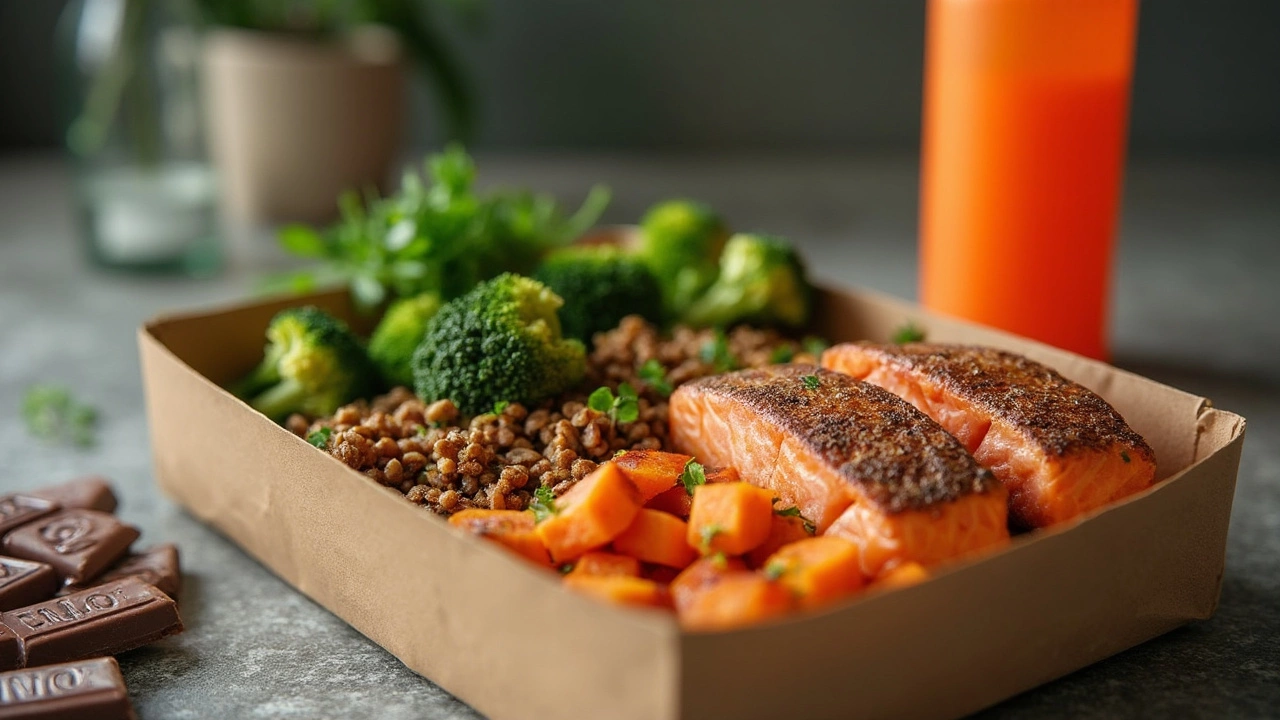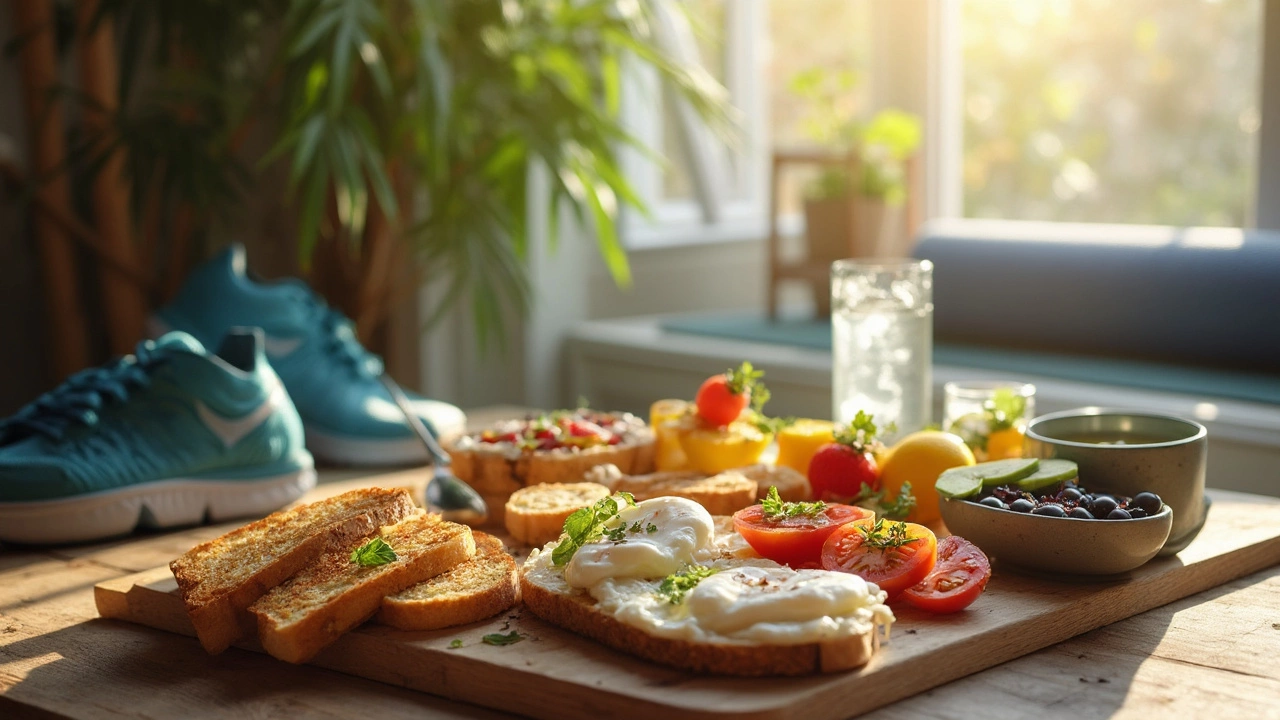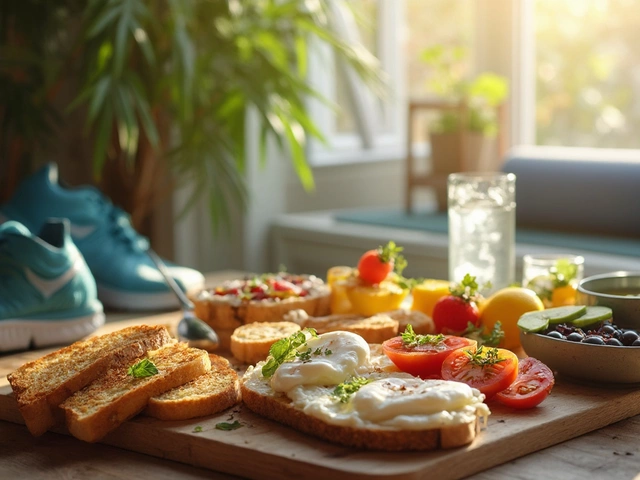Foods That Build Stamina: Eat Your Way to Lasting Energy
Feeling wiped out halfway through a workout or hitting the mid-afternoon wall? It's probably not about willpower—it's what’s on your plate. Stamina isn’t just for athletes; it matters for everyone who wants to keep going strong, whether you’re at the gym, at work, or chasing after kids.
A lot of people turn to energy drinks and sugary snacks hoping for a quick fix, but those highs crash pretty fast. The secret to real, steady stamina? The foods you eat every day. Some choices help your body last longer, recover faster, and avoid burnout—no fancy supplements needed.
We’ll break down which foods actually boost your endurance, why carbs and protein matter, and some easy eating tips you can start using today. Think of it as the real-life playbook for outsmarting tiredness, not just fighting through it.
- What Stamina Really Means
- Go-To Foods That Fuel Endurance
- Smart Carbs Versus Quick Fixes
- Protein Power for Long-Lasting Energy
- Everyday Eating Habits That Keep You Going
What Stamina Really Means
Stamina is your ability to keep going without running out of gas—whether you’re working, training, or just dealing with long busy days. It’s not just about big muscles or how fast you run. Stamina is about lasting energy and how well your body keeps up when you push it over time.
Technically, stamina covers both physical and mental endurance. That means not feeling completely drained after a tough workout and being able to stay focused through a long meeting or study session. When people talk about building stamina, they’re usually after more steady energy that lasts all day, not just a quick boost.
Here’s the thing: a lot goes into stamina, but food is a major player. Carbs fuel your muscles, protein helps you recover, and healthy fats keep you feeling full and support your metabolism. Let’s look at some real numbers so you can see how it all fits together:
| Stamina Factor | What It Does | Example Stat |
|---|---|---|
| Carbohydrates | Primary energy source for exercise | Can supply up to 60% of energy in moderate activity |
| Protein | Helps repair and build muscle | Recommended 1.2-1.7g per kg of body weight for active people |
| Hydration | Keeps energy and focus steady | A 2% drop in fluids can cause noticeable fatigue |
One thing a lot of folks miss: stamina isn’t set in stone. What you eat today influences how you’ll feel tomorrow. It’s a cycle—eat smarter, recover better, build more lasting energy. And it’s not just for gym rats. Anyone can feel their stamina improve with some small changes in their daily food routine.
Go-To Foods That Fuel Endurance
If you want next-level staying power, what you eat seriously matters. Skip the quick sugar fix and zero in on real foods that actually help your body go the distance. Here’s what deserves a regular spot on your plate:
- Oats: Packed with complex carbs and a little protein, oats are slow to digest and keep blood sugar steady. Grab a bowl for breakfast before workouts or intense days.
- Bananas: Probably the most portable pre-workout snack. Bananas provide fast-acting carbs plus potassium, which helps fend off muscle cramps.
- Sweet Potatoes: Loaded with fiber and vitamin C, sweet potatoes give you long-lasting carbs without the crash.
- Eggs: One egg packs about 6 grams of protein—plus B vitamins that help turn food into usable energy.
- Chicken Breast: Lean, full of protein, and easy to prep ahead for meals. Protein helps repair muscles and keeps hunger away during longer sessions.
- Nuts and Seeds: Almonds, pumpkin seeds, and walnuts are good picks. They have a mix of healthy fats, protein, and carbs—perfect for sustained energy.
- Greek Yogurt: Higher in protein than regular yogurt, plus some carbs for a balanced snack. Top it with fruit or some honey.
- Brown Rice: Simple, effective, and full of complex carbs and minerals. It doesn’t spike your blood sugar like white rice can.
Water matters too. Even mild dehydration—just 1–2% lost body weight—can mess with endurance, so drink regularly.
Some people swear by beetroot juice. Turns out, there’s science behind it. Beetroot juice is rich in nitrates, which have been shown in studies to boost stamina during high-intensity workouts by helping blood circulate better.
| Food | Main Nutrient | Stamina Boost |
|---|---|---|
| Oats | Complex Carbs | Slow, steady energy |
| Banana | Potassium, Sugar | Quick recovery, muscle support |
| Eggs | Protein, B Vitamins | Better muscle repair |
| Chicken Breast | Lean Protein | Makes you feel full, supports muscles |
| Beetroot Juice | Nitrates | Improves blood flow |
| Greek Yogurt | Protein, Carbs | Sustained energy boost |
Want a pro tip? Combine carbs and protein after a workout for best results. This combo helps you refuel and recover so you keep your stamina high over time.

Smart Carbs Versus Quick Fixes
If you want real stamina, start with carbs—but not just any carbs. Think of carbs as fuel for your body’s engine. The problem is, not all carbs run the show the same way. Quick fixes, like candy, soda, or white bread, give a fast burst of energy but then drop you into a slump. You get that sugar rush, maybe a boost for a few minutes, then you’re hungrier or more tired than before. Not great for anyone trying to power through a workout, a shift at work, or just life in general.
Smart carbs come from foods that hold onto their energy longer. Stuff like oats, brown rice, quinoa, lentils, and sweet potatoes doesn’t just get burned up and disappear. They take longer to digest, so you get a slow, steady flow of energy that actually helps with stamina. Whole grains and fiber-rich vegetables are your best friends here—these keep your blood sugar stable and help you avoid those annoying energy crashes.
Here’s how to spot and choose smart carbs:
- Pick whole grains: Swap white bread or pasta for whole grain versions. They’re loaded with fiber and vitamins.
- Reach for starchy veggies: Sweet potatoes, corn, and peas give lasting energy without the crash.
- Try beans or lentils: These pack a double punch—good carbs and some protein, too.
- Oats for breakfast: Oatmeal is way better than sugary cereal. It fills you up without spiking your blood sugar.
The trick? Make these slow-burning carbs a regular part of your meals, not just a trendy add-on. Your body adapts, and soon you’re lasting longer in the gym, at work, or wherever you need a lasting boost.
Protein Power for Long-Lasting Energy
If you're looking to build real stamina, protein is a must-have. It's not just for muscle heads or people bulking up—it’s for anyone who doesn’t want to tap out early. Your muscles need protein to recover from any kind of activity, from running to hauling groceries. If you skip out on it, fatigue sets in fast, and your body doesn’t bounce back as well.
Research shows that athletes who get enough protein perform better and recover faster. You don’t need to wolf down shakes all day, though. Aiming for roughly 1.2–2.0 grams of protein per kilogram of body weight per day is the sweet spot for most active folks. That could mean slightly more than usual, but it’s doable with normal food.
Wondering what to eat? Here are high-protein foods that actually help boost your energy and stamina:
- Chicken breast (lean and easy to prep)
- Eggs (cheap and versatile—scrambled, boiled, whatever you like)
- Greek yogurt (great for a snack or breakfast, with a bigger protein punch than regular yogurt)
- Tofu or tempeh (plant-based, packs a lot of protein per bite)
- Salmon and tuna (provides protein and healthy fats, awesome for longer exercises)
- Lentils and beans (good source for vegetarians, loads of fiber too)
Here’s a quick look at how much protein you actually get from some of the top picks:
| Food | Average Protein per Serving |
|---|---|
| Chicken breast (100g) | 31g |
| Egg (1 large) | 6g |
| Greek yogurt (170g/6oz) | 15g |
| Tofu (100g) | 8g |
| Canned tuna (100g) | 25g |
| Lentils, cooked (1 cup) | 18g |
Timing matters too. Spreading protein throughout your day—like some at breakfast, lunch, and dinner—helps your body keep steady energy and repair muscles better. If you’re working out, try to eat some protein within an hour or two after you're done. It’s not magic, but it really does help you come back stronger next time.

Everyday Eating Habits That Keep You Going
If you want serious stamina, what you eat is only half the story. How and when you eat is just as important. Spacing out meals, getting enough fluids, and picking snacks with lasting energy can make a huge difference. Consistency is key—your body loves a routine, and regular eating habits help you avoid those annoying energy crashes.
Here are easy habits that keep your engine running:
- Eat every 3-4 hours: Skipping meals tanks your energy, and big gaps between meals cause blood sugar swings. Small meals or snacks throughout the day keep things level.
- Mix up your macros: Every plate should have some carbs, a little protein, and healthy fats. This combo evens out the energy release.
- Hydrate like it matters: Even mild dehydration makes you feel tired and foggy. Aim for water over energy drinks and soda.
- Don't forget breakfast: People who eat breakfast have better endurance and focus. Go for oatmeal, eggs, or yogurt instead of pastries.
- Avoid the junk-carb spiral: Chips, white bread, and candy spike your blood sugar, then leave you dragging. Pick high-fiber or whole versions instead.
If you want the numbers, here’s why keeping meals regular helps. A study from the Journal of Nutrition found that folks who ate three balanced meals and two snacks had 15% better energy scores by midday versus those who skipped meals.
| Habit | Stamina Boost (%) |
|---|---|
| Regular meals with balanced macros | 15 |
| Drinking enough water daily | 12 |
| Choosing high-fiber snacks | 9 |
The bottom line? Stick to a regular eating pattern, hydrate, and skip those sugar crashes. These changes might sound basic, but they build the kind of lasting energy you really notice over time. Making these tweaks does more for your stamina than any quick-fix product on the shelf.









